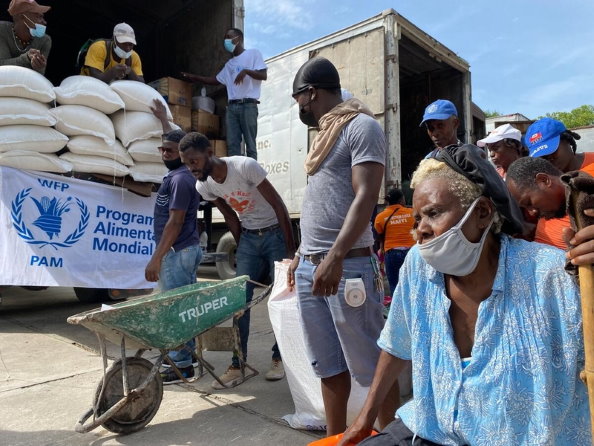
WFP boosts its ongoing support in Haiti as quake compounds miseries
World Food Programme, 26 August 2021
PORT AU PRINCE – Battered by multiple crises in recent years, Haitians who survived the recent 7.2 magnitude earthquake are now dealing with crumbled homes, lost livelihoods and limited or no access to food. The United Nations World Food Programme (WFP) is stepping up its ongoing vital support to desperately food-insecure Haitians in the area and working with the Government and partners to extend support to those newly in need.
“It is heart breaking to see families sleeping on the streets without a roof over them. Their houses have been reduced to dust. Public buildings like schools, churches and hotels where they could have found temporary shelter have also been destroyed,” said Lola Castro, WFP Regional Director for Latin America and the Caribbean, from Les Cayes in Haiti.
“The earthquake rattled people who were already struggling to feed their families due to economic and climate shocks, and insecurity. The compound effects of multiple crises are devastating communities in the south faced with some of the highest levels of food insecurity in the country.”
WFP plans to provide support to 215,000 people in urgent need of food assistance in the Sud, Grand’Anse and Nippes departments, the worst affected areas; an increase from the 138,000 people we were assisting before the earthquake.
Before the disaster struck, WFP was providing food and cash assistance in the south of Haiti. WFP has reached 48,000 people in the affected areas since 14 August and distributed over 15,000 hot meals, mostly in hospitals, to patients, their families and medical staff.
Expanding on-going support, WFP has provided food to 13,000 people this week in the remote mountainous areas of Maniche and Camp Perrin, both in the Sud department. With limited access to food, people told WFP that they were left to picking fruits from trees to sustain themselves. WFP also plans to extend food distributions to food insecure urban areas in the south.
Access to communities in the south was already limited due to recurrent political unrest, gang fights and roadblocks. Damage caused by the earthquake to roads and bridges and heavy rain, following Tropical Storm Grace, are posing further challenges.
Ensuring a coordinated and efficient response to the emergency, WFP is working closely with the Haitian General Directorate of Civil Protection and the National Coordination for Food Security.
Maintaining a vital lifeline to the affected south, the UN Humanitarian Air Service (UNHAS) managed by WFP, is flying a helicopter with medical and humanitarian supplies as well as frontline workers to support relief efforts. WFP is also using trucks and a barge to transport water, hygiene kits, blankets, food, and fuel for the humanitarian community.
Haiti is in the midst of the Atlantic hurricane season, predicted to be more turbulent than average. Supporting disaster preparedness efforts in the country, WFP had prepositioned food across Haiti to respond swiftly in case of an emergency. WFP thanks its donors for flexibility to use resources for the hurricane season for this emergency.
The 7.2 magnitude earthquake that struck Haiti on 14 August has left more than 2,200 people dead and over 12,000 injured with severe damage to roads and public infrastructure.
Note to the editor:
Broadcast quality video material available here
High-resolution photos available here
Original article here.